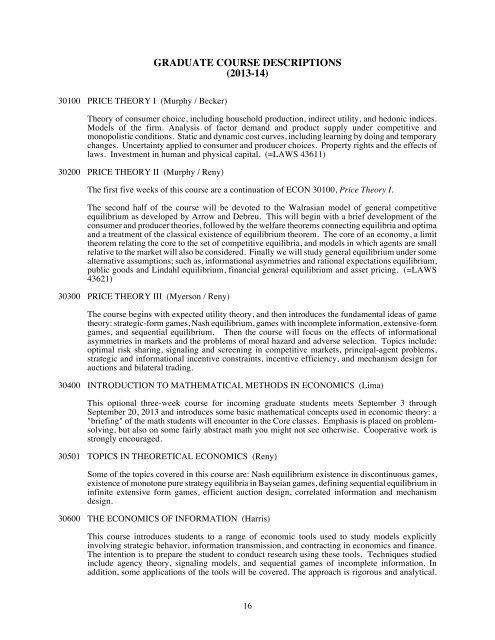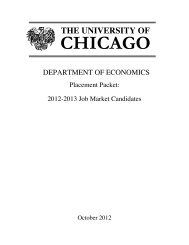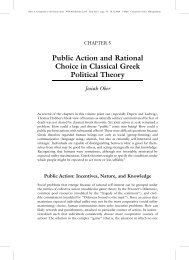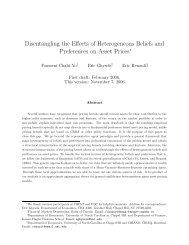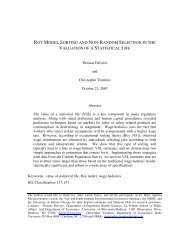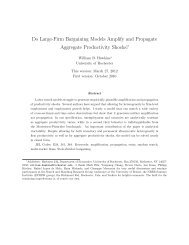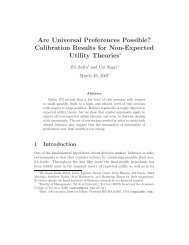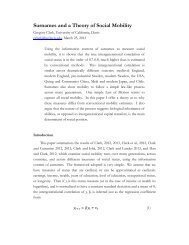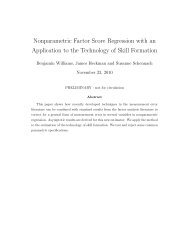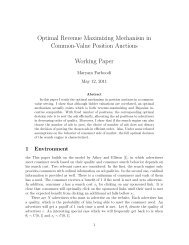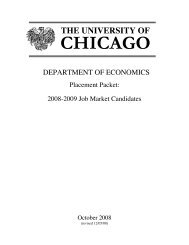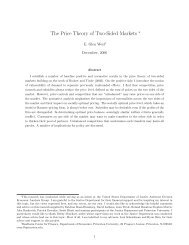Graduate Program Guidebook - University of Chicago Department of ...
Graduate Program Guidebook - University of Chicago Department of ...
Graduate Program Guidebook - University of Chicago Department of ...
You also want an ePaper? Increase the reach of your titles
YUMPU automatically turns print PDFs into web optimized ePapers that Google loves.
GRADUATE COURSE DESCRIPTIONS(2013-14)30100 PRICE THEORY I (Murphy / Becker)Theory <strong>of</strong> consumer choice, including household production, indirect utility, and hedonic indices.Models <strong>of</strong> the firm. Analysis <strong>of</strong> factor demand and product supply under competitive andmonopolistic conditions. Static and dynamic cost curves, including learning by doing and temporarychanges. Uncertainty applied to consumer and producer choices. Property rights and the effects <strong>of</strong>laws. Investment in human and physical capital. (=LAWS 43611)30200 PRICE THEORY II (Murphy / Reny)The first five weeks <strong>of</strong> this course are a continuation <strong>of</strong> ECON 30100, Price Theory I.The second half <strong>of</strong> the course will be devoted to the Walrasian model <strong>of</strong> general competitiveequilibrium as developed by Arrow and Debreu. This will begin with a brief development <strong>of</strong> theconsumer and producer theories, followed by the welfare theorems connecting equilibria and optimaand a treatment <strong>of</strong> the classical existence <strong>of</strong> equilibrium theorem. The core <strong>of</strong> an economy, a limittheorem relating the core to the set <strong>of</strong> competitive equilibria, and models in which agents are smallrelative to the market will also be considered. Finally we will study general equilibrium under somealternative assumptions; such as, informational asymmetries and rational expectations equilibrium,public goods and Lindahl equilibrium, financial general equilibrium and asset pricing. (=LAWS43621)30300 PRICE THEORY III (Myerson / Reny)The course begins with expected utility theory, and then introduces the fundamental ideas <strong>of</strong> gametheory: strategic-form games, Nash equilibrium, games with incomplete information, extensive-formgames, and sequential equilibrium. Then the course will focus on the effects <strong>of</strong> informationalasymmetries in markets and the problems <strong>of</strong> moral hazard and adverse selection. Topics include:optimal risk sharing, signaling and screening in competitive markets, principal-agent problems,strategic and informational incentive constraints, incentive efficiency, and mechanism design forauctions and bilateral trading.30400 INTRODUCTION TO MATHEMATICAL METHODS IN ECONOMICS (Lima)This optional three-week course for incoming graduate students meets September 3 throughSeptember 20, 2013 and introduces some basic mathematical concepts used in economic theory: a"briefing" <strong>of</strong> the math students will encounter in the Core classes. Emphasis is placed on problemsolving,but also on some fairly abstract math you might not see otherwise. Cooperative work isstrongly encouraged.30501 TOPICS IN THEORETICAL ECONOMICS (Reny)Some <strong>of</strong> the topics covered in this course are: Nash equilibrium existence in discontinuous games,existence <strong>of</strong> monotone pure strategy equilibria in Bayseian games, defining sequential equilibrium ininfinite extensive form games, efficient auction design, correlated information and mechanismdesign.30600 THE ECONOMICS OF INFORMATION (Harris)This course introduces students to a range <strong>of</strong> economic tools used to study models explicitlyinvolving strategic behavior, information transmission, and contracting in economics and finance.The intention is to prepare the student to conduct research using these tools. Techniques studiedinclude agency theory, signaling models, and sequential games <strong>of</strong> incomplete information. Inaddition, some applications <strong>of</strong> the tools will be covered. The approach is rigorous and analytical.16


